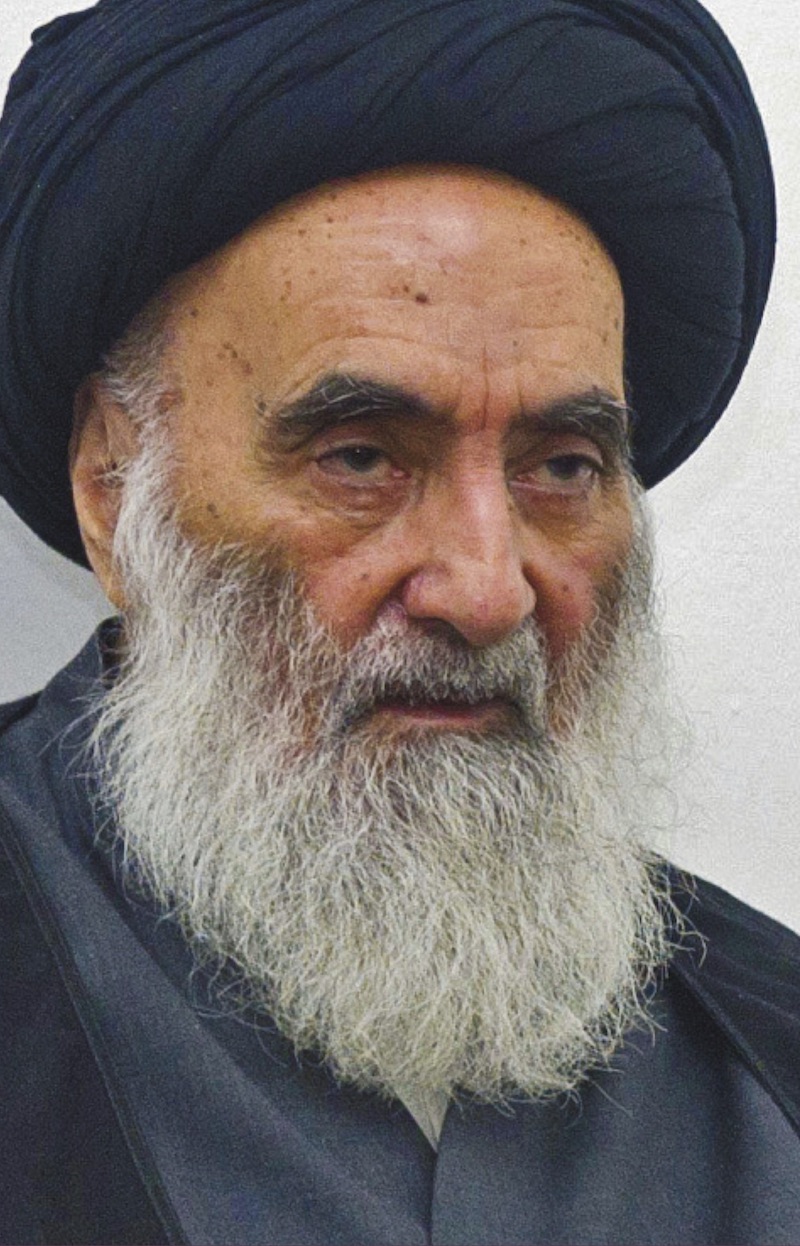Grand Ayatollah Sayyid Ali Hussein Al-Sistani is the prime marja, or spiritual reference, for Ithna ’Ashari‘a (Twelver) Shia Muslims. signifying his esteemed status as a source of emulation for Shia Muslims worldwide. He is widely recognized for his profound religious scholarship and spiritual leadership within the Shia Islamic tradition. His influence extends far beyond the religious sphere, encompassing a broad spectrum of social and political matters. He is the leading sheikh of the Hawza Seminary in Najaf, Iraq, and the preeminent Shia cleric globally.
Birth: 4 August 1930 (Age: 95)
Source of Influence: Scholarly, Lineage: Lineage
Influence: Highest authority for 21 million Iraqi Shia, and also internationally known as a religious authority to Usuli Twelver Shia
School of Thought: Shi‘a, Traditional Shi‘a, Traditional Twelver Shi‘a
Status: Featured in current year
Grand Ayatollah Sayyid Ali Hussein Al-Sistani is the prime marja, or spiritual reference, for Ithna ’Ashari‘a (Twelver) Shia Muslims. signifying his esteemed status as a source of emulation for Shia Muslims worldwide. He is widely recognized for his profound religious scholarship and spiritual leadership within the Shia Islamic tradition. His influence extends far beyond the religious sphere, encompassing a broad spectrum of social and political matters. He is the leading sheikh of the Hawza Seminary in Najaf, Iraq, and the preeminent Shia cleric globally.
Preeminent Shia Cleric: Sistani is descended from a family of religious scholars and was educated in the leading institutions of Iran. He later went to Najaf, Iraq, to study under the Grand Ayatollah Abu Al-Qasim Al-Khoei. Upon Al-Khoei’s death in 1992, Sistani took over as Grand Ayatollah, inheriting Khoei’s following. He soon rose to become the leading cleric in Iraq.
Marja Taqlid: Sistani’s influence in the Twelver Shia sect stems from his scholarly lineage and education, which have enabled him to reach the status of marja taqlid—the highest status in the usuli branch of Twelver Shia Islam. Marja taqlid means literally one who is worthy of being emulated—placing Sistani in a position of great authority over Twelver Shia Muslims. He is followed by an estimated 21 million Twelver Shia Muslims, making him the most influential marja taqlid in the world. He oversees a network of over 2,000 religious schools and seminaries in Iraq and around the world.
Financial Influence: Sistani also has very significant financial clout. As a marja his followers give him a religious tax (khums, Arabic for one-fifth). The redistribution of this tax for the common good is one of the key roles of a marja. Much of this remittance is redistributed through the Al-Khoei Foundation—the largest Twelver Shia development organization in the world that maintains a network of educational and humanitarian establishments for both Shia and non-Shia Muslims. In 2022 it spent over $100 million.
Quietest Influence: Significantly, Sistani is against the idea of Velayat-e Faqih, suggesting Shia clerics should not get involved in politics. Paradoxically, this approach has afforded him very strong influence as a religious leader unsullied by politics. Sistani has used his position of quietist authority to wield influence also as a peacemaker in turbulent, post-invasion Iraq. His comments about the political scene have been credited with bringing about stability at key moments. He has identified eliminating political corruption and improving public services as the main issues of the day. He has also issued strong statements against DA’ISH, calling on Iraqis to unite against the militants.
Protecting Minorities: Grand Ayatollah Al-Sistani has played a significant role in Iraq’s post-Saddam Hussein era, advocating for democracy and the protection of the rights of religious and ethnic minorities. His guidance has been instrumental in shaping the country’s political landscape and promoting peaceful coexistence among its diverse population.
Meetings: Sistani rarely meets officials but made an exception for Iran’s former President Rouhani and Foreign Minister Mohammed Javad Zarif in March 2019. Pope Francis also visited Sistani’s home in Najaf in March 2021 during the Pope’s visit to Iraq.
Gaza: Al-Sistani has specifically addressed the Muslim world, calling for unified efforts to stop the Israeli genocide in Gaza and to provide greater support to Palestinians. The cleric has criticised the lack of international accountability for Israel’s crimes and blamed certain world powers for this failure.
“Women who go forth to the polling centers on election day are like Zaynab, who went forth to Karbala”
49 thousand. number of students his office supports
1960 the year he became a mujtahid



